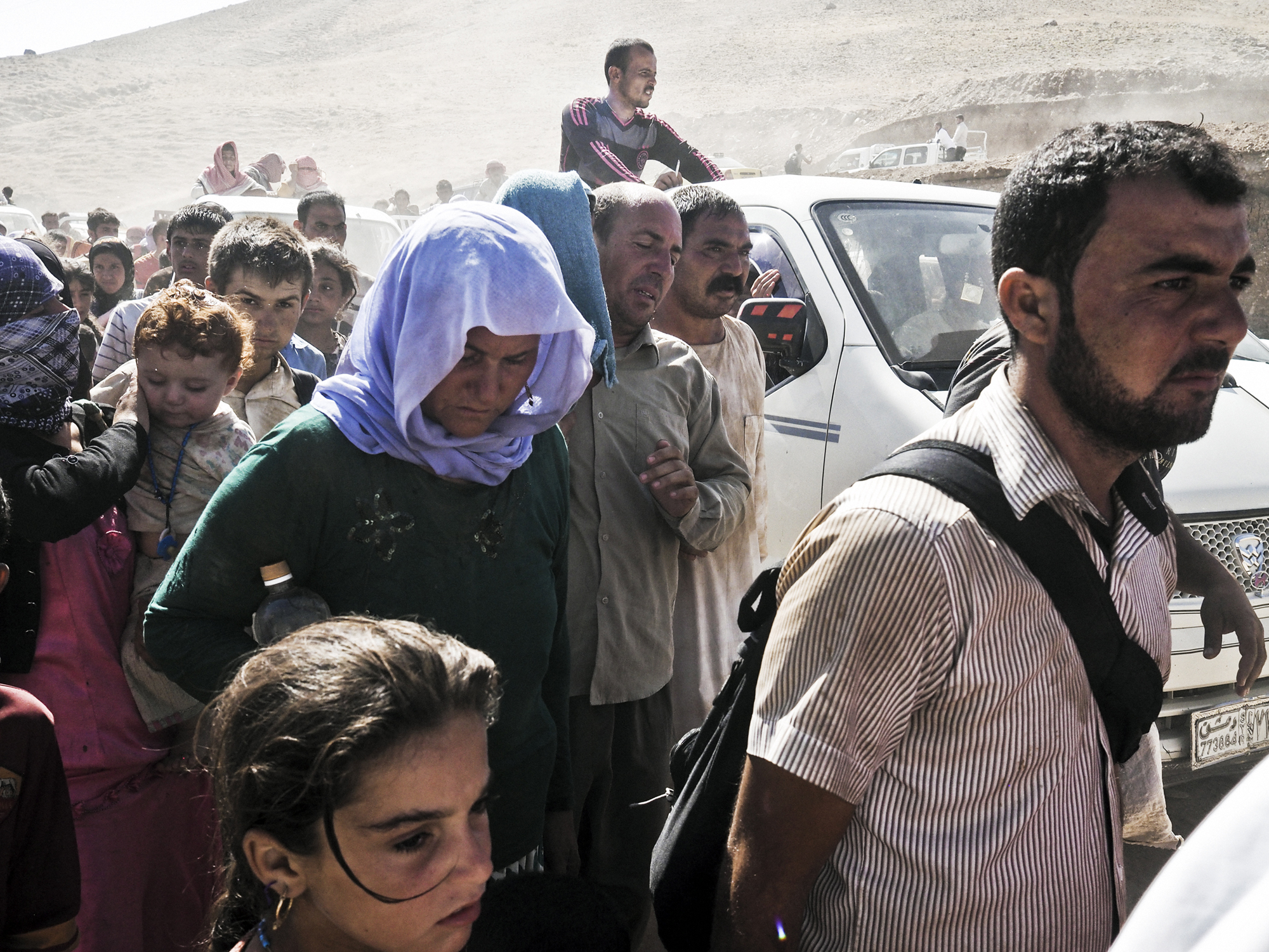
In a small shop, four Yezidi men watch Kurdish peshmerga fighters perform drills on a local television station. Kurdish forces that have led the efforts to rescue over 50,000 ethnic Yezidis from Mt. Sinjar in northern Iraq, where they have been stranded for the last ten days.
“The peshmerga are stronger than the Iraqi army,” says Tassin Qasim Assi, watching the Kurdish fighters. “The Iraqi soldiers are just there for the money.” Assi fled Sinjar, the Yezidi heartland, more than a week ago and is now taking refuge in Erbil with his family. He says he has faith in the Kurdish fighters, but that they need more support to fight the militant army of the Islamic State of Iraq and Greater Syria (ISIS).
In recent days the world has been captivated by the plight of thousands of members of the unique Yazidi sect, which mixes elements of Shiite and Sufi Islam and Christianity, among others relgions. Yazidis have lived as a minority around the mountains of northern Iraq for centuries. They were little known to the wider world until recent images of Yezidi refugees, dehydrated and terrified, were shown around the world, which in part helped prompt recent U.S. airstrikes on ISIS to prevent what President Obama called “genocide.”
While many Yezidis don’t consider themselves Kurds at all, they are Kurdish speaking and have lived in areas held by the Kurdistan Regional Government (KRG). That gives the Kurds some responsibility for their fate. “We are not going to dictate who is a Kurd and who is not,” says Falah Mustafa Bakir who heads the KRG’s Department of Foreign Relations. “The important thing is we are a tolerant society and protect all ethnic and religious minorities.”
Bakir says the Kurdish forces now battling the ISIS militants include his Iraqi-Kurdish peshmerga fighters and Kurdish fighters from Syria, as well as some Iraqi national forces. But for the Iraqi national army the defense of the north and minority groups like the Yazidis is unlikely to be a major priority—especially with political parties grappling for power in Baghdad.
“The [Iraqi] army aren’t interested at the moment,” says Shatha Besarani who works for the Iraqi Women’s League. “The Shiites in the south are trying to have it all to themselves. They don’t care what happens in the middle and the north.” Her comments reflect what many in Iraq feel is Baghdad’s Shiite-first agenda. Shiite Prime Minister Nouri al-Maliki has been clinging to power despite calls from Sunni, Kurdish and even Shiite Iraqis for him to step down and make way for a more inclusive government. Moderate Shiite Haider al-Abadi seems set to take the spot, with endorsements from Iran and others, but al-Maliki has yet to fully give up power.
The political struggle in Baghdad has hampered the already-weak Iraqi army’s ability to fight the radical Sunni militants who now control swathes of the country. The national forces have already failed against ISIS in the field. Thousands of Iraqi soldiers fled their posts in June as the militants approached, shedding their uniforms and dropping their weapons—weapons that ISIS is now turning against them and the peshmerga. “We know about of the capability of the Iraqi army and air force,” says Bakir, suggesting that its limited ability isn’t adequate for the job. “And this is a huge operation.”
Bakir says the Kurds need military assistance to fight ISIS as well as humanitarian aid to help the Kurds deal with the more than one million Iraqis displaced by the fighting who are taking shelter in their territory. For its part the U.S. is sending in 130 new military advisors to help bolster Kurdish efforts to save the Yezidis and push back the militants. The UK has been providing humanitarian support in the form of airdrops and along with France promising arms support. “The air strikes boosted the morale of the peshmerga,” says Bakir. “But we need to properly arm and equip them to fight these terrorists.”
To the Yezidis, the world’s sudden focus on their plight hasn’t translated into enough international support to save them. Back in the shop the Yazidi men look at pictures they say are of their dead brethren, bodies lying in the desert near Sinjar. Adanan Khalaf, a 25-year-old Yezidi from Sinjar, thrusts forward his phone.
“Where was America?” asks Khalaf. “They are telling us to become Muslims or die.”
And while the calls for better arms for the peshmerga and military assistance are strong here, for many Yazidis, Iraq is no longer a place they can feel safe as one of the region’s smallest minorities.
“We want to go out,” says Assi. “Tell them we want to go America. Or we want to go to Europe. We can’t stay here.” —With reporting by Mirren Gidda/London
More Must-Reads From TIME
- The 100 Most Influential People of 2024
- The Revolution of Yulia Navalnaya
- 6 Compliments That Land Every Time
- What's the Deal With the Bitcoin Halving?
- If You're Dating Right Now , You're Brave: Column
- The AI That Could Heal a Divided Internet
- Fallout Is a Brilliant Model for the Future of Video Game Adaptations
- Want Weekly Recs on What to Watch, Read, and More? Sign Up for Worth Your Time
Contact us at letters@time.com